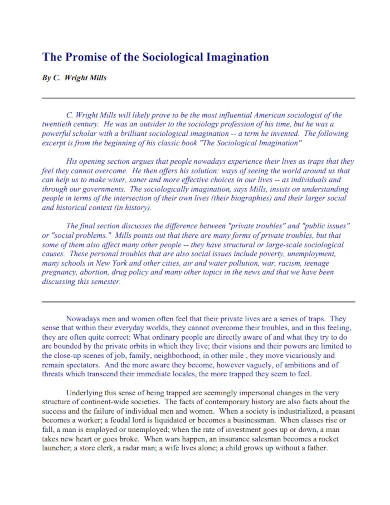Imagine walking down a busy city street. You see people from all walks of life, each with their own story and experiences. You might notice a homeless person asking for change, a group of teenagers laughing together, or a businessman rushing to a meeting. But what if you could see beyond the surface level, and understand the social forces that shape these individuals’ lives? This is the power of sociological imagination.

Image: www.examples.com
This article explores the concept of sociological imagination, especially how it helps us understand the complex issue of race and its impact on individuals and society. Understanding how social structures and historical forces have created and maintained racial inequality is crucial for building a more just and equitable world.
What is Sociological Imagination?
Sociological imagination, coined by C. Wright Mills, is the ability to see the connections between our personal experiences and the larger social forces that shape them. It’s about stepping outside of our own individual perspective and recognizing how social structures, institutions, and historical events influence our lives and the lives of others. Think of it like zooming out from our personal world to see the bigger picture and how we all fit in.
Race Through the Sociological Imagination Lens
When we apply sociological imagination to race, we begin to understand that our individual experiences and opportunities are not merely a matter of personal choice. Rather, they are deeply intertwined with systems of power, privilege, and oppression that have historically and perpetually disadvantaged certain racial groups. Let’s explore some key examples:
1. The History of Slavery and Its Lasting Impact:
The legacy of slavery in America is not simply a chapter in the past. It has profoundly shaped the present by creating a racial hierarchy that continues to disadvantage Black people and other people of color. Sociological imagination helps us see how systemic racism, rooted in historical injustices, permeates our institutions, leading to disparities in education, healthcare, housing, and economic opportunities.

Image: www.corpgov.net
2. Racial Profiling and the Criminal Justice System:
The overrepresentation of Black and Brown people in the criminal justice system is not just a result of individual behavior. It reflects a long history of racial bias and discrimination within policing, prosecution, and sentencing. Sociological imagination allows us to see how systemic racism manifests in practices like racial profiling, which disproportionately targets people of color for suspicion and arrests, even for minor offenses.
3. Racial Wealth Gap and the Intergenerational Effects of Inequality:
The stark difference in wealth accumulated by racial groups is not a coincidence. Generations of systemic racism have created a wealth gap that disadvantages Black and Brown families. This gap, built on historical injustices like discriminatory housing policies, results in limited access to quality education, healthcare, and financial resources. Understanding this historical context through a sociological imagination lens reveals how the wealth gap is passed down across generations, perpetuating cycles of poverty and inequality.
4. Representation and Stereotypes in Media:
The media’s portrayal of race plays a significant role in shaping societal perceptions. Sociological imagination helps us critically examine how media representations, often driven by historical stereotypes and biases, can perpetuate harmful narratives and reinforce racial prejudices. It also reveals how underrepresentation of certain racial groups in media can limit opportunities for visibility and empowerment.
5. Immigration and the Construction of “Otherness”:
The idea of “otherness” is often used to categorize and marginalize immigrants and people of color. Sociological imagination helps us understand how systems of power and dominant narratives create these categories, often dehumanizing and limiting the experiences and contributions of immigrants. It also helps us recognize the historical context of migration and how political and economic factors influence immigration patterns and the reception of immigrants.
Moving Forward with Sociological Imagination
The key to dismantling systemic racism and creating a more just and equitable society is to use sociological imagination. By understanding how our personal experiences are shaped by broader social forces, we can challenge the status quo and advocate for change.
Here’s how you can use this tool in your daily life:
- Be mindful of your own biases: Everyone has biases, and being aware of these biases is the first step to challenging them. Understand how your own background and experiences shape your perceptions of race and racial issues.
- Educate yourself and others: Take time to learn about the history of racism and its lasting effects. Share this knowledge with others and create opportunities for open and honest conversations about race.
- Support organizations working for racial justice: By supporting organizations and movements dedicated to fighting racism and inequality, you can contribute to creating a more just world.
Sociological Imagination Examples Race
Conclusion
The sociological imagination is a powerful tool for understanding the complexities of race and inequality. By stepping outside of our individual perspectives and recognizing the interconnectedness of our experiences with broader social forces, we can work towards a world where everyone has the opportunity to thrive. Let us all embrace the power of sociological imagination to dismantle systemic racism and build a more just and equitable future.






